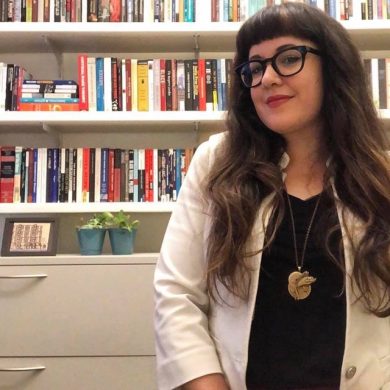 Dr. Jennifer Lynn Kelly is an Associate Professor in the Feminist Studies Department and the Critical Race and Ethnic Studies Department at UC Santa Cruz. She is a THI Faculty Public Humanities, Digital, and Community-Engaged Research Fellow for 2022-2023, and also serves as a Faculty Mentor in the Graduate Student Success Program. Dr. Kelly’s first book, Invited to Witness: Solidarity Tourism across Occupied Palestine (Duke University Press, 2023), is a multi-sited, interdisciplinary study of solidarity tourism in Palestine. She is currently at work on a co-edited public-facing alternative guidebook, Detours: A Decolonial Guide to Palestine, which also includes workshops and a potential website. In February, we discussed the importance of interdisciplinary space to embark on creative, collaborative, emplaced scholarship, and the ethos of “radical generosity” that permeates Dr. Kelly’s pedagogical practice, mentorship approach, and community-building efforts both in and outside of academia.
Dr. Jennifer Lynn Kelly is an Associate Professor in the Feminist Studies Department and the Critical Race and Ethnic Studies Department at UC Santa Cruz. She is a THI Faculty Public Humanities, Digital, and Community-Engaged Research Fellow for 2022-2023, and also serves as a Faculty Mentor in the Graduate Student Success Program. Dr. Kelly’s first book, Invited to Witness: Solidarity Tourism across Occupied Palestine (Duke University Press, 2023), is a multi-sited, interdisciplinary study of solidarity tourism in Palestine. She is currently at work on a co-edited public-facing alternative guidebook, Detours: A Decolonial Guide to Palestine, which also includes workshops and a potential website. In February, we discussed the importance of interdisciplinary space to embark on creative, collaborative, emplaced scholarship, and the ethos of “radical generosity” that permeates Dr. Kelly’s pedagogical practice, mentorship approach, and community-building efforts both in and outside of academia.
Hello Professor Kelly! Thanks for chatting with us about your research and all the wonderful humanities work you’ve been involved in. Congratulations again on being named a 2022-2023 THI Faculty Public Humanities, Digital, and Community-Engaged Research Fellow! Your project, Detours, includes a public-facing alternative guidebook, Detours: A Decolonial Guide to Palestine, along with accompanying workshops and a potential website. You shared about the co-edited volume in your wonderful Imagination Series contribution in April 2022. Could you update us about the evolution of this project and what you are currently focused on?
Of course! Thanks so much for inviting me to share this project with you. When I wrote for the Imagination Series in April, my co-editors Lila Sharif (Arizona State University) and Somdeep Sen (Roskilde University) and I had just begun to receive submissions to the volume. Since then, we have worked with authors through their revisions processes, we have solicited further art projects, we have conducted interviews for the volume, we have organized the submissions into their respective sections of the volume, and we have drafted our Introduction to the volume. It has cohered into such a beautiful, necessary project.
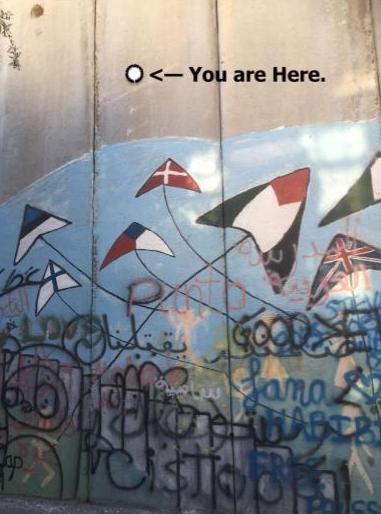
Annexation Wall, Bethlehem, Palestine (Photo collaboration by Somdeep Sen and Lila Adib Sharif)
When we embarked on this project, we issued a Call for Papers that imagined contributions that centered tourism in all its forms: tour guides’ narratives, reflections on tourism, meditations on tourist presence, anti-colonial tour itineraries, and material on the space of the tour itself. While we did receive meaningful contributions of this sort, they were far outweighed by those that exceeded the parameters that we laid out in the call. We received narrative conversations between family members about meaning and translation in the diaspora, speculative fiction pieces on Palestinian futurity, photo-essays on fleeting returns, recipes, collages, lesson plans, field guides, and love letters. Having crafted the space for a volume of this sort–in all its creativity and capaciousness–we welcomed the liberty contributors took with their pieces: a freedom to imagine otherwise, to insist on the Right of Return, to chart different histories beyond those laid out by the settler state. With each contribution, the volume changed shape. With each piece, the tenor shifted and the conversation changed. In this way, what we received far outpaced the invitation we extended.
Reflecting on the project in the Imagination Series in April, I wrote that, when given the space to imagine a decolonized future, and when that imaginative labor is treated as critical liberatory work, an archive will cohere. And the archive that has cohered here, which we are honored to curate, is a testament to the critical, creative, imaginative work our contributors are doing to chronicle Palestinian pasts, diagnose the colonial present, and envision, demand, and blueprint a liberated Palestine.
Your Detours project is multi-genre–the volume features prose, poetry, art, speculative fiction, and guided walking tours; interdisciplinary–combining methodologies and frameworks from critical race and ethnic studies, feminist studies, critical border studies, and critical tourist studies, etc.; and immensely collaborative–inviting partnerships with tourists, artists, activists, host delegations, and local organizations. As a humanities scholar, why is it important for you to extend your intellectual labor beyond the academy, and cultivate these expansive modes of solidarity and emplacement?
Thanks so much for this question. There are so many things that make a book like this possible: supportive and imaginative series editors; an eager and robust editorial collective; authors’ and artists’ readiness to contribute; funding for the subvention costs of publication; and–and this is key–the (inter)disciplinary space to embark on this kind of collaboration. For me, that means doing this work at UC Santa Cruz in Critical Race and Ethnic Studies (CRES), where we have departmentalized with a capacious vision of what counts as research productivity–a vision that is inclusive of public-facing anti-colonial organizing, and in Feminist Studies, where we have long argued for collaborative work to be understood as intellectual production that is just as necessary as sole-authored monographs.
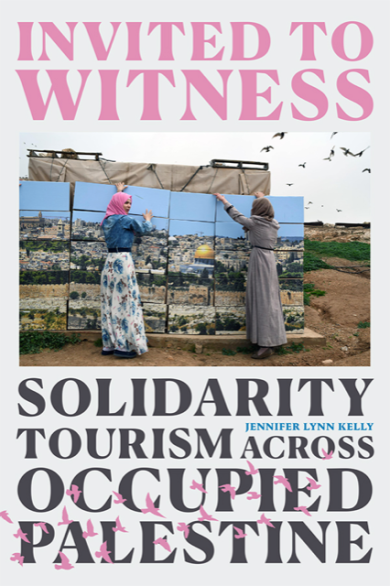
Invited to Witness: Solidarity across Occupied Palestine (Duke University Press, 2023)
Indeed, CRES has become a departmental home for so many of us who want to do collaborative and relational work across disciplines, divisions, and regions. Camilla Hawthorne (Sociology and CRES) and I, for example, co-authored a Special Issue for the open-access Critical Ethnic Studies Journal–housed in CRES at UCSC–on borderland regimes in global perspective, where we invited contributors to think through the circulation of technologies, expertise, policing, and surveillance across borders alongside the circulation of anti-colonial strategies via transnational social movements. By bridging conversations that are typically kept in separate academic silos—for example, critical refugee studies, Asian American studies, Black studies, Native studies, Middle East studies, European critical migration studies, comparative colonial studies—our contributors produced theoretically rigorous and empirically grounded investigations of borders outside of what is typically understood as belonging to the field of border studies. As an open-access special issue dedicated to the study of borderland regimes that grew out of our work in our respective research sites, Italy and Palestine/Israel, we staged a conversation on sites marked by foreclosed mobility for some and expansive mobility for others. We also opened this conversation outwards, hosting an interview with organizers on Black immigration justice in the Bay Area, a political education document on the wildcat strike on our own campus, and public-facing syllabi on borders and surveillance– alongside a recorded public launch event that enabled our contributors who authored articles to connect their pieces to their broader organizing work. In this, we sought to not only trouble disciplinary boundaries but also dismantle the pay walls that isolate academic work from the political contexts in which it is produced. In order to do this kind of collaborative and public-facing work as our jobs, our jobs have to value that work, and in CRES we have fought for recognition of that work as central to our intellectual and political trajectories.
The Humanities at UCSC has made possible not only work that extends beyond disciplines and divisions but also work that extends beyond the university itself.
For my own monograph, Invited to Witness: Solidarity Tourism across Occupied Palestine, I used Humanities Division-granted research funds to make my book open-access so that it would be accessible to tour guides, tourists, organizers, teachers, students, activists, community members, and beyond. Because my work is so centrally about how tourists understand the ethics of their presence in Palestine, and how tour guides’ labor to shape and reshape their understandings, I wanted my work to be available to tour guides crafting itineraries and tourists preparing to travel to Palestine. It has so far been taken up in preparing delegates for their travel and preparing organizers as they shape delegations, as well as taught in undergraduate and graduate classrooms engaging questions of tourism, militarism, occupation, voyeurism, decolonization, and ethnography. In this way, the Humanities at UCSC has made possible not only work that extends beyond disciplines and divisions but also work that extends beyond the university itself. Importantly, our public-facing work does not supplant or replace the important political work we do in our classrooms; it instead invites us to think about pedagogy more broadly, asking us to reflect on where we and our students learn, what and where we teach, and how and where our work gets taught.
This year you are serving as a mentor in the Graduate Student Success program. What drew you to this program? Why is it important to provide humanities graduate students with community and mentorship?
As a graduate student, it is a rare thing to have this kind of mentorship institutionalized through a program like GSS.
As Camilla and I worked on our Special Issue, we prioritized junior faculty, postdocs, and graduate students and we also talked a lot about mentorship, writing, and publishing, which led us to doing workshops on the publishing process for special issues as part of our THI Research Cluster. When we were subsequently invited to serve as co-mentors in the Graduate Student Success (GSS) program, we enthusiastically agreed. As a graduate student, it is a rare thing to have this kind of mentorship institutionalized through a program like GSS. I know I would have loved to have had the opportunity and space to have candid conversations during graduate school about graduate work, fellowships, fieldwork, mentorship, time management, and the cruelty of the academic job market.
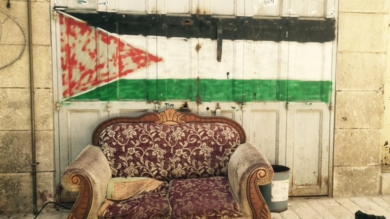
Couch and Palestinian Flag, Hebron, Palestine (Photo by Somdeep Sen)
Cathy Hannabach recently interviewed me for the Ideas on Fire Podcast, Imagine Otherwise, and we talked extensively about pace–the pace of graduate school, the pace of the job market, the pace of the tenure track, the pace of the pandemic, the pace of parenting. I reflected on how the pandemic laid bare an imperative to slow down and a ramping up of work–an expectation for academics to be even more available, to be at everything at once because everything is in your living room on Zoom, to sign up for back-to-back meetings since commute time can be turned into grind time. I tried to keep up with these expectations for the first year–which was also a year of negotiations for my partner and I to be in the same place while we navigated a tumultuous path to pregnancy, a tumultuous pregnancy, and even more tumultuous labor and birth. Only once my daughter was born did I fully reorient my relationship to work. With no daycare for her first 18 months, I showed up for work in the ways that were possible and nothing more. I would have liked to cultivate this ethos far earlier in my career and I hope to share with mentees that there are multiple ways to do this job and burnout doesn’t have to be one of them. I would like to help them learn, early on, that slowing down and doing less is not a marker of negligence and overextension is not a marker of rigor; that we can still do careful, rigorous scholarship even if our time spent does not look the way it may have used to. And that that is likely a good thing.
I try to cultivate radical generosity in my mentorship, as in my classes, and I work to not confuse rigor with callousness.
This kind of generosity extends not only to ourselves but also to our interlocutors, our subjects of study, and our students. I recently had a meeting with a student doing a substantive research project on tourism who was so grateful to have found a faculty member who thought critically and generously about tourist practices, situating them in their historical contexts, taking stock of everything going on the scene of the tour and not just the rewarded most scathing critique. In this, I try to cultivate radical generosity in my mentorship, as in my classes, and I work to not confuse rigor with callousness. Too often, academics use rigor as an alibi for unkindness. I teach my students that you can–and should–be rigorous and also kind, sharp and also thoughtful, successful and also generous. In this way, I work to jettison the individualistic, self-interested, transactional approaches to relationships with colleagues and mentees that can sometimes (read: often) thrive in academia: relationships built on fear, hierarchy, and derision. Instead, I work to craft mentor/mentee relationships based on shared political and intellectual commitments, appreciation for one another’s labor, and reciprocal guidance marked by my willingness to offer my relatively-recent experience(s) of graduate school and the job market and their willingness to guide me through that endlessly shifting terrain as they experience it today.
What advice would you give to humanities scholars who are interested in amplifying the “public” dimensions of their research, writing, and academic community?
Thank you for this thoughtful question–I love the opportunity to reflect on the process of putting your work out in the world. The first time I heard the descriptor “public intellectual,” it was in reference to Palestinian scholar Edward Said. As someone who studied colonialism and tourism in my undergraduate work, as someone who puzzled at the ubiquitous reference to Said’s Orientalism (1978) in all my courses and the simultaneous omission of Palestine in those very courses, and as someone who went to graduate school to study the place of Palestine in American studies, feminist studies, and ethnic studies, I am committed to producing open-access work on Palestine that answers Said’s call to candidly and publicly condemn Israeli state violence.
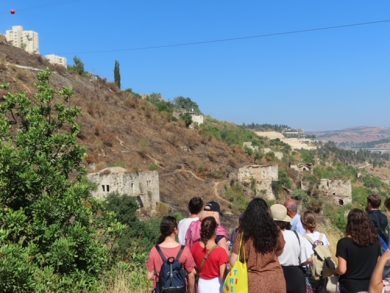
FFIP Tour, Lifta, Palestine (Photo by Jennifer Lynn Kelly)
Guiding students toward doing this kind of public-facing work is not only a political act but also an emotional one. Writing is raw and vulnerable; it shifts and adapts with you and without you; you may not agree with what you wrote ten years (or ten minutes) ago. Releasing it publicly–especially without paywalls–is an act of bravery that positions the political stakes of the project over the anxiety that would rather delimit the work’s reach. Ideas on Fire recently circulated a set of New Year’s Writing Resolutions. Among them were: “I will treat my writing with compassion rather than scorn (especially when revising),” “I will remember that I am more than my word count,” and “I will submit the damn thing rather than tinkering endlessly in search of perfection.” The act of sharing our work–mess and all–takes practice. And that process, I’ve found, is best practiced if we can let go of what we produce and allow it to be received in a way we can’t control. Terrifying as that is, it delinks production from perfection and allows us to better create and share work that can reshape how our readers move in the world.
In this process is also, I think, a renegotiation of what sharing work is meant to look like. In academia, we are conditioned to expect an audience ready to pounce and we are rewarded for being that type of interlocutor. A friend and colleague, Jonathan Rosa, once wrote–in a social media post announcing a talk he was about to give–that he was going to “try out an argument.” I remember being an anxious and terrified graduate student, stunned at the prospect of “trying out an argument,” marveling if I would ever be able to go into a talk with that kind of elasticity and confidence. While I’m not sure I ever have, I do appreciate the way this approach compels you to lower the stakes, to allow yourself to be wrong, to be vulnerable to being corrected, and–most importantly–to be willing to share your work in order to see it grow and change. And in order for our work to grow and change, to shift with each audience and each workshop, we have to see it as contributing to an ongoing conversation rather than providing the final, perfect word.
Banner Image: Cacti as markers of Palestinian presence, Zochrot’s JNF Erasure of Palestine Tour, Haditha, Historic Palestine (Photo by Jennifer Lynn Kelly)